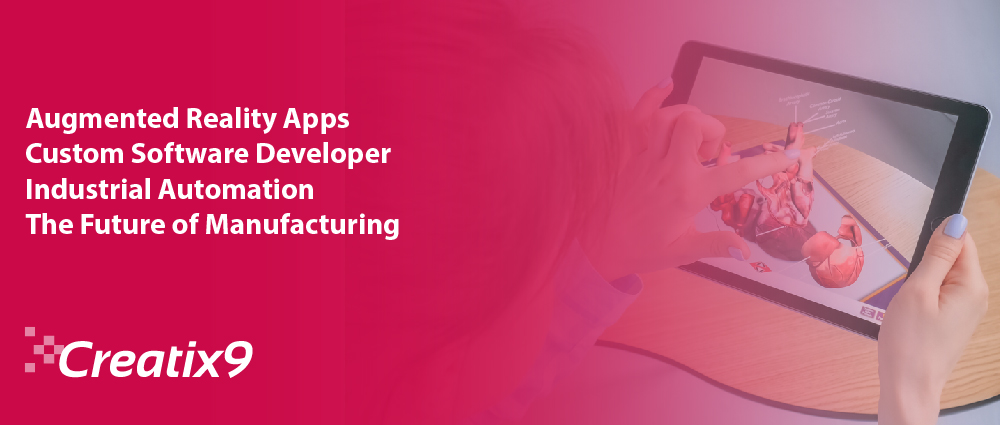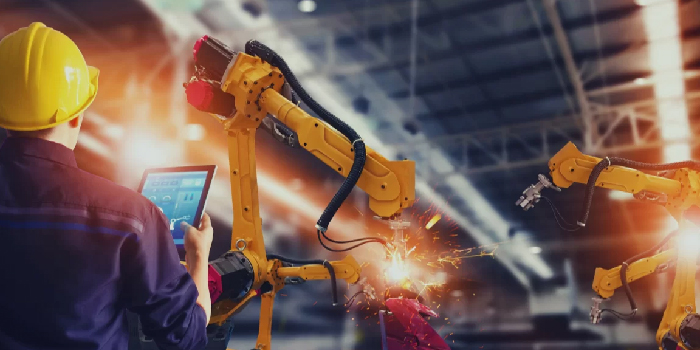
The world of manufacturing is constantly evolving, and with advancements in technology, the industry is experiencing a significant shift towards automation. With automation, the need for manual labor is reduced, making manufacturing processes more efficient and cost-effective. According to Statista, in 2023, it is anticipated that the value added in manufacturing would reach US$14.83 trillion at the growth rate of 3.57% per year is anticipated.
One of the most exciting technological advancements in the field of manufacturing is the integration of augmented reality (AR) apps, which has the potential to transform the industry. In this article, we will explore the impact of augmented reality apps and custom software development on industrial automation.
Augmented Reality Apps

Augmented reality (AR) is a technology that overlays digital information onto the real world. This technology has been around for several years but has only recently gained popularity with the development of AR apps. AR apps use a smartphone’s camera and sensors to create an interactive experience that enhances the real-world environment. These apps can be used for a variety of purposes, from gaming to education, and are now being implemented in the manufacturing industry.
One of the primary benefits of AR apps is that they can provide real-time information to workers. For example, workers can use an AR app to view detailed information about a machine or product without having to leave their work area. This information can include maintenance requirements, schematics, and operational procedures. This allows workers to quickly and easily access the information they need to perform their tasks efficiently, reducing the time and cost associated with training and troubleshooting.
Another benefit of AR apps is that they can be used to improve safety in the workplace. For example, workers can use AR apps to view safety warnings or instructions while they are performing tasks. This can help to prevent accidents and injuries, which can be costly both in terms of human suffering and financial liability.
Custom Software Developer

To fully realize the benefits of AR apps in manufacturing, companies need to work with a custom software developer. A custom software developer can design an AR app that is specifically tailored to a company’s needs. This app can be customized to include the information and functionality that is most important to the company’s manufacturing processes. Additionally, a custom software developer can integrate the app with existing manufacturing systems, such as enterprise resource planning (ERP) software.
Working with a custom software developer can also help companies to overcome some of the challenges associated with implementing AR apps. One of the main challenges is ensuring that the app is user-friendly and easy to use. A custom software developer can design an app that is intuitive and easy to navigate, ensuring that workers can quickly and easily access the information they need.
Another challenge is ensuring that the app is compatible with different types of hardware. A custom software developer can design an app that is compatible with a wide range of hardware, ensuring that it can be used by workers on different devices.
Industrial Automation

AR apps are just one example of the many technological advancements that are driving industrial automation. Industrial automation refers to the use of technology to automate manufacturing processes, from assembly lines to quality control. The goal of industrial automation is to reduce the need for human intervention, making manufacturing processes more efficient and cost-effective.
One of the key benefits of industrial automation is that it can reduce labor costs. Automation can perform tasks that would otherwise require human labor, reducing the number of workers needed to complete a manufacturing process. This can lead to significant cost savings for companies.
Another benefit of industrial automation is that it can improve product quality. Automation can perform tasks with a high degree of accuracy and consistency, reducing the likelihood of errors or defects. This can lead to higher-quality products and fewer returns or recalls.
Future Trends in Augmented Reality Apps, Custom Software Development, and Industrial Automation

As we look ahead, it is clear that augmented reality apps, custom software development, and industrial automation will continue to shape the future of the manufacturing industry. These technologies are constantly evolving, and new trends are emerging that will further enhance their capabilities and impact. In this section, we will explore some of the future trends in these areas.
Advanced Augmented Reality Experiences
While augmented reality apps have already made significant strides in the manufacturing industry, the future holds even more advanced experiences. We can expect to see improved graphics, more realistic virtual objects, and enhanced interactions between the physical and digital worlds. This will enable workers to have a more immersive and intuitive experience, leading to increased productivity and efficiency.
Integration of Artificial Intelligence
Artificial intelligence (AI) will play a crucial role in the future of augmented reality apps, custom software development, and industrial automation. AI algorithms can analyze vast amounts of data and provide real-time insights to workers. For example, AI-powered AR apps can offer predictive maintenance suggestions based on machine performance data, reducing downtime and optimizing operational efficiency. Additionally, AI can help in automating complex decision-making processes, leading to improved accuracy and faster response times.
Wearable Technology
Wearable devices, such as smart glasses and haptic feedback gloves, will become more prevalent in the manufacturing industry. These devices will enable workers to access information and interact with augmented reality interfaces in a hands-free manner. Wearables will provide a seamless integration between workers and the digital world, allowing for greater mobility and flexibility on the shop floor. This technology will also enhance worker safety by providing real-time alerts and guidance in hazardous environments.
Remote Collaboration

With the advancement of augmented reality apps and custom software development, remote collaboration will become more seamless and effective. Workers in different locations can use AR apps to connect and collaborate on tasks, troubleshooting, and training. For instance, an expert technician can guide a less-experienced worker through a complex repair process using AR overlays, reducing the need for travel and on-site support. This trend will not only improve efficiency but also enable access to a global talent pool and increase scalability.
Internet of Things (IoT) Integration
The integration of IoT devices with augmented reality apps and custom software development will enable real-time data exchange between machines, sensors, and AR interfaces. This integration will provide workers with comprehensive insights into the manufacturing process, allowing them to monitor machine performance, track inventory, and optimize production schedules. IoT-enabled AR apps will also enable seamless connectivity between physical assets and their digital representations, enabling efficient inventory management and reducing the risk of errors.
Continuous Learning and Training
Augmented reality apps and custom software development will play a significant role in continuous learning and training in the manufacturing industry. AR-based training modules will allow workers to learn new skills and acquire knowledge in a more interactive and engaging manner. Custom software solutions will facilitate the creation of personalized learning experiences tailored to individual workers’ needs. This trend will foster a culture of continuous improvement and upskilling, enhancing workforce capabilities and adaptability.
Cloud Computing and Edge Computing

Cloud computing and edge computing technologies will support the scalability and performance requirements of augmented reality apps, custom software development, and industrial automation. Cloud-based solutions will provide storage and processing capabilities for large-scale data analysis, while edge computing will enable real-time decision-making at the device level, reducing latency and improving responsiveness. This combination will allow for efficient data management and computation, supporting the complex requirements of these technologies.
The future of the manufacturing industry lies in the continued evolution and integration of augmented reality apps, custom software development, and industrial automation. Advanced augmented reality experiences, the integration of AI, wearable technology, remote collaboration, IoT integration, continuous learning
Conclusion
The use of augmented reality apps, custom software development, and industrial automation has revolutionized the manufacturing industry, providing unprecedented levels of efficiency, productivity, and safety. These technologies have already made significant advancements in the industry, but the future holds even more exciting possibilities. The integration of AI, wearable technology, IoT devices, cloud computing, and edge computing will enable even greater levels of connectivity, collaboration, and data-driven decision-making. Continuous learning and training will foster a culture of upskilling, enhancing workforce capabilities and adaptability. As the industry continues to embrace these technological advancements, it will remain at the forefront of innovation and competitiveness, driving growth and progress in the years to come. Furthermore if you are looking for custom software developer, then get in touch with Creatix9.

